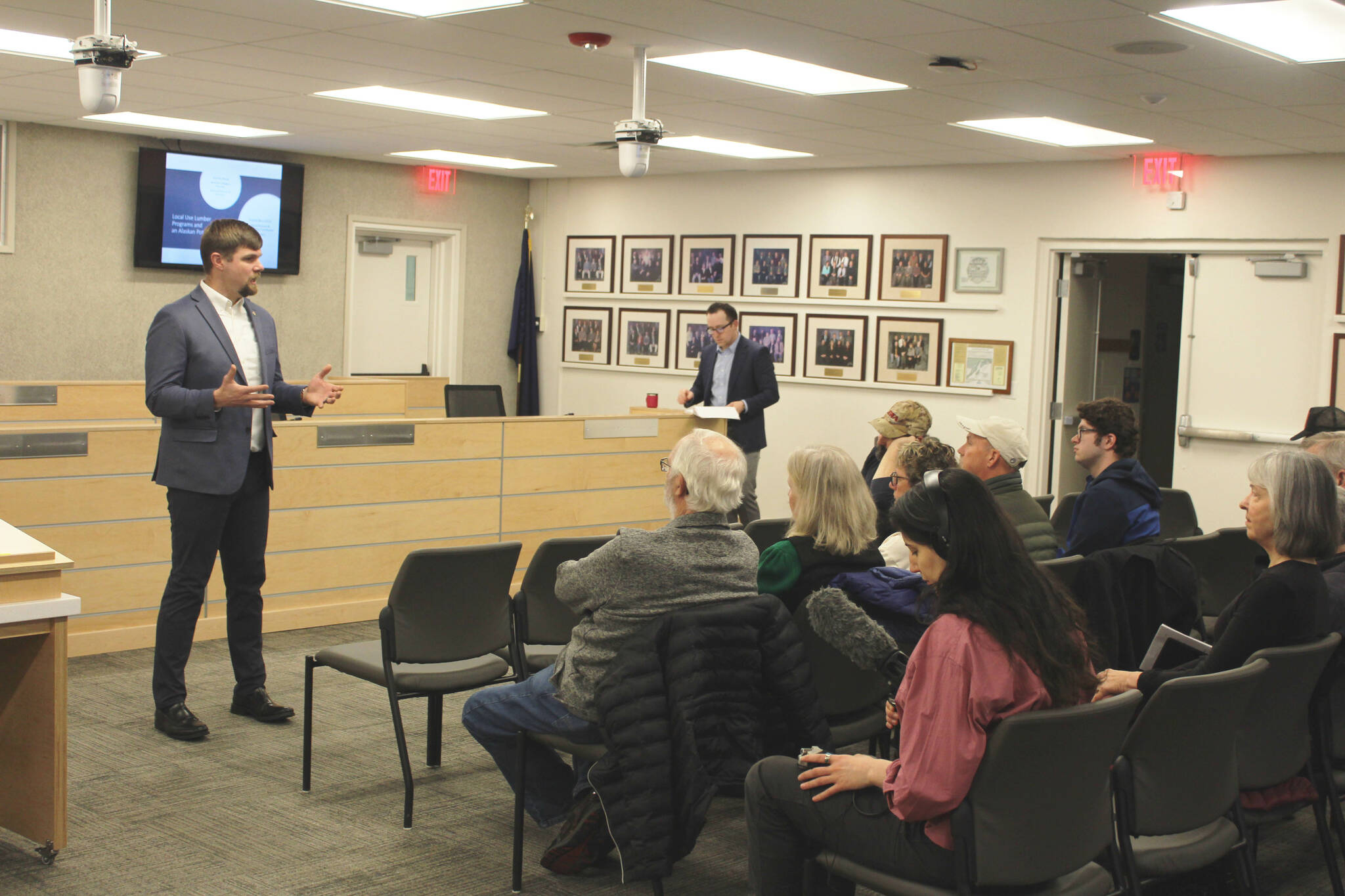About 25 people filed into the George A. Navarre Admin Building on Saturday, where Sen. Jesse Bjorkman, R-Nikiski, held a town hall to brief residents on what he’s been up to in Juneau.
Bjorkman, who is in his first term as the Senator for District D, was elected to the Alaska Legislature last year and succeeded Peter Micciche in the role. Bjorkman chairs the Senate Labor and Commerce Committee and sits on seven others including Education and Fish & Game.
Over the course of almost two hours, Bjorkman fielded questions from attendees and talked about topics such as school funding, workforce development and state finances.
When it comes to state finances, Bjorkman said there is more interest this session than in years past in finding a fiscal solution for Alaska. That solution, he said, entails a state spending cap that “makes sense,” ensuring that constitutionally-mandated services are funded and resolving the annual question of a state dividend amount for residents.
The rest of Alaska’s challenges, Bjorkman said, become easier once the services the state is required to provide, such as public safety and education, are taken care of. It is clear, he said, that Alaska can no longer afford to deficit spend and draw from savings, and at the end of the day the state doesn’t have enough money to pay for everything people may want.
“We can’t have a state government that runs on political promises that somehow you can have your roads plowed when you want, you have troopers that come when you call them, you can have the police and firefighters show up at your door in less than 10 minutes, you can have good schools and oh, by the way, we’re gonna have the same tax structure in this state on oil and gas and industry that we have now, plus, you can get a $4,000 PFD,” Bjorkman said. “That math does not work. It doesn’t work.”
On the topic of education, Bjorkman said he doesn’t support adding to Alaska’s unfunded liability as lawmakers consider changes to state retirement plans. Unfunded liability refers to the value of benefits that have been promised to workers but are not yet funded, according to the Alaska Policy Forum.
“We certainly don’t want to create a program through a retirement system that is going to put the state on the hook for more money,” Bjorkman said.
Attendee LaDawn Druce said she is a retired educator who returned to work this semester as a counselor for four local high schools said the State of Alaska needs to return to a defined benefit program for school staff and said schools can no longer operate at the “status quo” when it comes to state funding.
“Last year, there were relatively no applicants, to be honest, or I wouldn’t be doing what I’m doing this semester,” Druce said of school counselor vacancies.
The Senate Finance Committee, Bjorkman said, held a hearing last week during which the state’s cost benefit analysis from when it moved to a defined contribution system was presented. Bjorkman said that presentation showed that the defined contribution plan currently in place costs Alaska more money while delivering less benefits for employees.
Bjorkman was also asked about S.B. 82, which would establish a voluntary buyback program for certain set net entry permits. That bill was long carried by former State Sen. Peter Micciche as a way to reduce tensions between eastern Cook Inlet’s commercial set net fishermen and other fishing user groups on the Kenai and Kasilof rivers.
“The Alaska State Legislature finds that it is in the public interest to reduce the number of commercial set net fishers and decrease the pressure of commercial fishing on the east side of Cook Inlet, to create a more economically viable and sustainable set net fishery, and to allow more fish for in-river users,” the bill says.
The bill would establish a voluntary buyback program, to become effective after an affirmative vote by permit holders, through which a lottery-style system would be used to retire existing fishing permits. Micciche has previously called the initiative a way for set net fishermen to fairly exit the fishery and reduce the amount of set net gear in the inlet.
“I think a lot of people have an interest in having less nets in the water and so this bill would facilitate that,” Bjorkman said Saturday.
After an attendee expressed skepticism about whether or not permits are worth the $260,000 described in the legislation, Bjorkman clarified that contributions from nongovernmental organizations, rather than state money, will be used for permit buybacks.
As of Monday evening, S.B. 82 is the only bill that Bjorkman has sponsored so far this session. However, he said Saturday that he is interested in creating a local use lumber program that will enable sawmillers to grade their own wood products and then sell the resulting lumber.
More information about Bjorkman’s work in Juneau can be found on his legislative webpage at akleg.gov/basis/Member/Detail/33?code=bjk.
Reach reporter Ashlyn O’Hara at ashlyn.ohara@peninsulaclarion.com.

